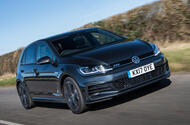European diesel sales fell sharply in 2018

The Volkswagen Golf was Europe's best-selling car in 2018, despite sales of diesel versions falling 30%Cars registrations remained stable in Europe in 2018 despite diesel struggles, while EVs outsold PHEVs
Sales of diesel-engined cars dropped by nearly a fifth in Europe last year, but this was offset by a rise in demand for petrol and electrified vehicles.
In total, 15.6 million vehicles were registered in Europe last year, according to data from industry analyst Jato. That was an increase of 346 cars over 2017, despite a sharp decline in the final quarter of the year due to multiple models being temporarily unavailable as a result of the introduction of the new WLTP emissions test.
Demand for diesel fell in 20 of the 27 European countries, headed by a 30% decline in the UK, with 5.59 million registrations in 2018. That's a decline of 18% on 2017, when 6.76 million were registered. Diesel cars accounted for 35% of the total European car market, the lowest level since 2001.
The fall in diesel sales was offset by a rise in registrations of petrol engined cars, which accounted for 57% of total sales. Around a million more petrol-engined cars were sold in 2018 than the previous year.
There was also a continued rise in demand for alternatively fuelled vehicles (AFVs), with 944,800 registrations in 2018. That represents 6.8% of the car market, up from 737,400 in 2017.
Notably, the biggest rise in AFV demand was for fully electric vehicles, with registrations up by 47% from 132,800 in 2017 to 195,300 in 2018. As a result, registrations of electric vehicles outstripped those of plug-in hybrids (180,000) last year. Meanwhile, there were 555,000 hybrid vehicles registered, an increase of 24% year-on-year.
Top European markets, brands and models
Germany remained Europe’s biggest car market in 2018, with 3,435,789 registrations, a year-on-year drop of 0.2%. The UK remained second, with 2,367,147 registrations, despite a 6.8% fall year-on-year. That ties with Sweden for the biggest decline in Europe.
Lithuania was the biggest-growing market, with 32,382 registrations, representing 25.4% growth on 2017. The Romanian market grew by 21.4%, with 158,268 registrations.
Volkswagen was the top performing brand across the 27 markets, with 1,746,411 registrations, compared to 1,099,289 for Renault and 1,014,190 for Ford.
The German firm also had two of the three top models, with the Golf remaining Europe’s best-seller despite an 8% year-on-year decline in registrations to 445,754 – largely due to a 30% drop in diesel model sales.
Polo registrations rose by 10% to 299,920, moving the supermini to third in the European best-seller list behind the Renault Clio (336,268).
Read more
2018's most popular cars in Europe - by country
Comments
Post a Comment